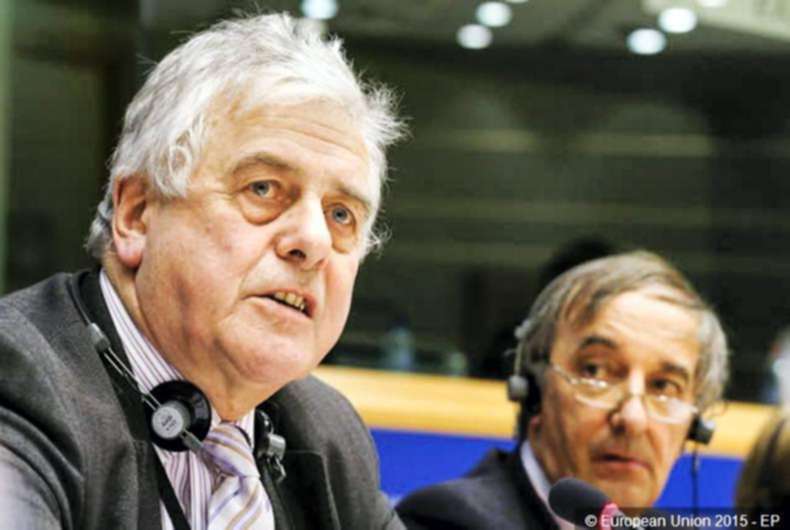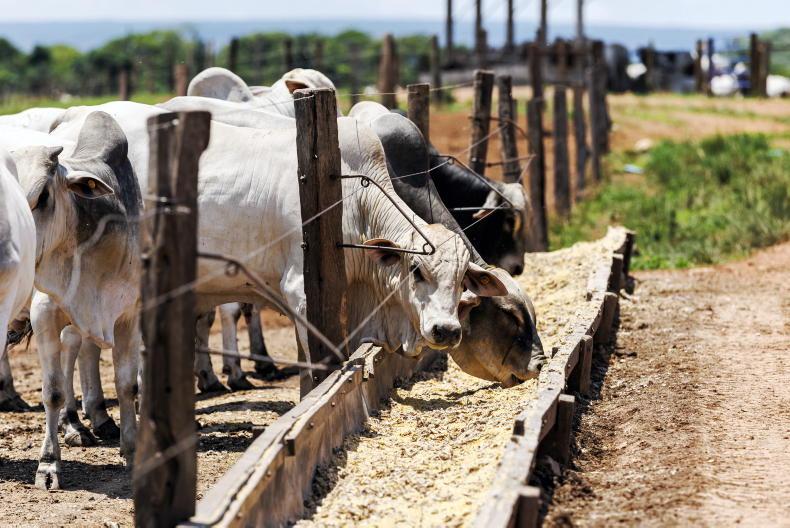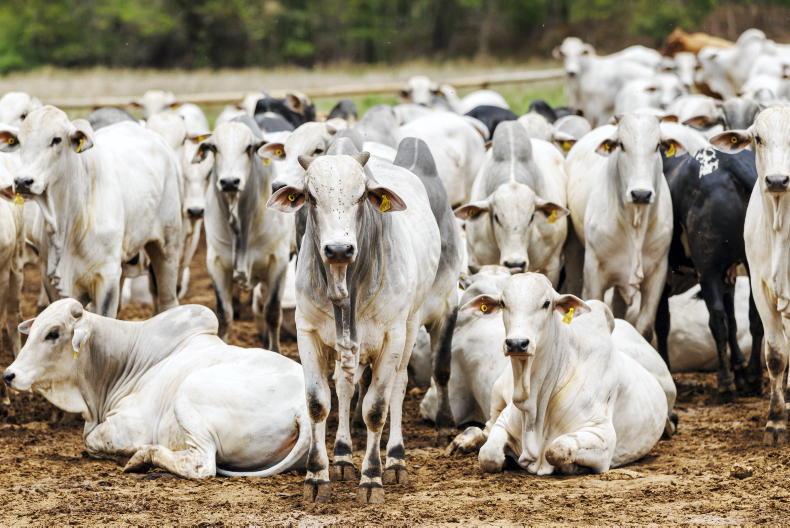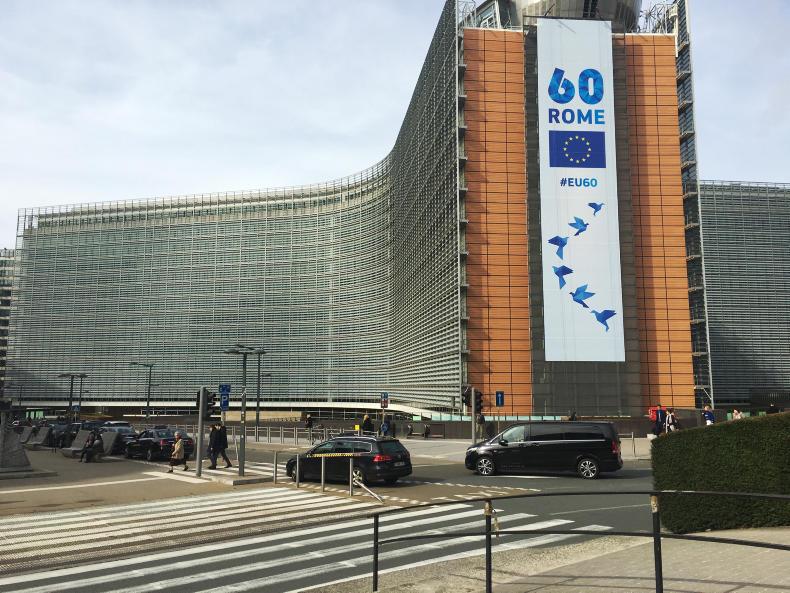The European Parliament’s Agriculture Committee appears to be on a collision course with the EU Commissioner for Agriculture and Rural Development, Phil Hogan, over what needs to be done to support the dairy sector.
It could be May before the committee gets to make up its mind on the matter and an unknown time after that before the Parliament is moved to act.
Opposing views were expressed this week in Brussels at a hearing on the milk package and the prospects for the dairy sector, convened as part of an own-initiative report being put together by Jim Nicholson MEP.
The official line from the Commission was that there is no crisis in the sector and there is no need to review the prices at which dairy products (butter and skimmed milk powder) are purchased by public funding and put into intervention storage.
Jim Nicholson disagreed. He said that there is a crisis and the safety net levels need to be raised.
He accused the Commission of “sitting on its hands” even though it had stated after the crisis in 2009 that it would never again fail to act in time to support the dairy sector.
Summing up, after more than three hours of presentations by experts, with questions and answers during the hearing, Nicholson acknowledged that milk quotas had not saved the sector from the crisis in 2009 and, along with others, he appeared to rule out any reintroduction of the system of supply control after quotas are ended on 31 March this year.
Nicholson said that members of the European Parliament now have powers of co-decision with the Commission and being co-legislators brings with it co-responsibility to find solutions. He, and several other members of the committee, wanted to hear suggestions from experts that could provide solutions.
Among those who were asked for their views during the hearing was United Dairy Farmers chief executive, David Dobbin. He said that the members of United certainly regard the current situation as a crisis.
Asked what could be done to provide assistance in the short-term, Dobbin said that there isn’t much that can be done other than to raise the intervention price.
He said that the market currently is sitting just above the intervention price level and he believes that if a higher price was set it could raise the whole market – without much product actually having to be bought in to intervention.
Dobbin also pointed out that the last time the EU Commission had intervened in the market, it had made a lot of money from the exercise as it sold product out onto a buoyant market.
Dobbin stated that if it is left to the market it will sort itself out, but there will be a lot of suffering in the process, pointing out that there is an added problem for Northern Ireland in the weaker euro exchange rate against sterling. He said everyone in Europe is worried about a “double dip” in the price – which could occur if and when a flush of extra milk is produced after the end of quota, especially if spring weather is favourable.
Dobbin also said that any future growth in EU dairy output needs to be able to compete on world markets as the EU internal market is fully supplied.
Other suggestions made by Dobbin included:
Need for an effective/efficient futures market for dairy products within Europe on which dairy processors and traders could sell forward with trust as this would give transparency of price formation and could give something on which to base milk purchase contracts. Need for finding an outlet for cheese (to replace the Russian market) as the Russian embargo on EU products has had a devastating effect. Need for the EU Commission to achieve access to dairy product market in China on terms similar to those enjoyed by New Zealand and Australia (whose sales into China are at reduced import tariffs and tariff free for at least part of the year). Need for co-operation of all in the supply chain. Dobbin said that it is not a problem of processors competing against producers, it is a matter of the whole supply chain needing to be competitive to survive.
The European Parliament’s Agriculture Committee appears to be on a collision course with the EU Commissioner for Agriculture and Rural Development, Phil Hogan, over what needs to be done to support the dairy sector.
It could be May before the committee gets to make up its mind on the matter and an unknown time after that before the Parliament is moved to act.
Opposing views were expressed this week in Brussels at a hearing on the milk package and the prospects for the dairy sector, convened as part of an own-initiative report being put together by Jim Nicholson MEP.
The official line from the Commission was that there is no crisis in the sector and there is no need to review the prices at which dairy products (butter and skimmed milk powder) are purchased by public funding and put into intervention storage.
Jim Nicholson disagreed. He said that there is a crisis and the safety net levels need to be raised.
He accused the Commission of “sitting on its hands” even though it had stated after the crisis in 2009 that it would never again fail to act in time to support the dairy sector.
Summing up, after more than three hours of presentations by experts, with questions and answers during the hearing, Nicholson acknowledged that milk quotas had not saved the sector from the crisis in 2009 and, along with others, he appeared to rule out any reintroduction of the system of supply control after quotas are ended on 31 March this year.
Nicholson said that members of the European Parliament now have powers of co-decision with the Commission and being co-legislators brings with it co-responsibility to find solutions. He, and several other members of the committee, wanted to hear suggestions from experts that could provide solutions.
Among those who were asked for their views during the hearing was United Dairy Farmers chief executive, David Dobbin. He said that the members of United certainly regard the current situation as a crisis.
Asked what could be done to provide assistance in the short-term, Dobbin said that there isn’t much that can be done other than to raise the intervention price.
He said that the market currently is sitting just above the intervention price level and he believes that if a higher price was set it could raise the whole market – without much product actually having to be bought in to intervention.
Dobbin also pointed out that the last time the EU Commission had intervened in the market, it had made a lot of money from the exercise as it sold product out onto a buoyant market.
Dobbin stated that if it is left to the market it will sort itself out, but there will be a lot of suffering in the process, pointing out that there is an added problem for Northern Ireland in the weaker euro exchange rate against sterling. He said everyone in Europe is worried about a “double dip” in the price – which could occur if and when a flush of extra milk is produced after the end of quota, especially if spring weather is favourable.
Dobbin also said that any future growth in EU dairy output needs to be able to compete on world markets as the EU internal market is fully supplied.
Other suggestions made by Dobbin included:
Need for an effective/efficient futures market for dairy products within Europe on which dairy processors and traders could sell forward with trust as this would give transparency of price formation and could give something on which to base milk purchase contracts. Need for finding an outlet for cheese (to replace the Russian market) as the Russian embargo on EU products has had a devastating effect. Need for the EU Commission to achieve access to dairy product market in China on terms similar to those enjoyed by New Zealand and Australia (whose sales into China are at reduced import tariffs and tariff free for at least part of the year). Need for co-operation of all in the supply chain. Dobbin said that it is not a problem of processors competing against producers, it is a matter of the whole supply chain needing to be competitive to survive. 







SHARING OPTIONS